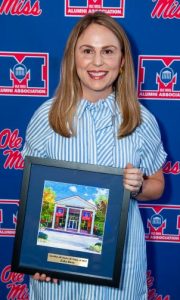Erika Berry – Alumna Spotlight
 Senior Director of Policy, TennesseeCAN
Senior Director of Policy, TennesseeCAN
Hometown: Brandon, MS
BA in Political Science, minor in Journalism (2008)
LinkedIn
For over a decade, Erika Berry has been working to improve educational outcomes for students across the South. While teaching middle school math in Charlotte, North Carolina, Berry visited her first charter school and saw first-hand what high expectations and transformational education look like in action. Four years later, she seized upon an opportunity to return to her home state of Mississippi, bringing those same transformational options and ultimately creating the Mississippi Charter Schools Association and later working in the Office of the Lieutenant Governor to impact education policies beyond public charter schools. These experiences eventually led her back to North Carolina where she served in the state education agency advising the superintendent’s office. Now, as the senior director of policy with TennesseeCAN, Berry has successfully advocated for a weighted student-based funding formula in Tennessee and is currently supporting policymakers in their implementation of the formula to ensure students remain the focus of all funding decisions. She was recently recognized with a 40 Under 40 award from the Ole Miss Alumni Association.
Why did you decide to major in political science?
Ole Miss has such a strong history of producing some of Mississippi’s strongest political leaders and thought leaders, so I knew Ole Miss’s program was strong. I originally thought I wanted to attend law school after undergrad and I assumed the nuance gained from a political science concentration would complement the law school experience. While I ultimately did not go to law school, I do still believe a major in political science would be a strong compliment to law school.
What were some highlights from your undergraduate years?
There are two highlights from my undergraduate years that stand out, even 14-18 years later. As for an academic highlight, before taking Marvin King’s African American Politics class I sadly never felt the need or encouragement to ask myself questions about why racism still exists or even why pockets of poverty still exist, especially in communities of color. His class gave me the lens needed to see that poverty often exists because of systemic oppression. This lens is what has consistently helped me view various issues in my career. For example, when students are assigned to schools based on their home address, it makes logical sense that low-income students will be more likely to attend a school that has greater challenges than a school in a wealthier neighborhood, yet the way we fund schools is based on property values. In other words, the schools that need the most funding are often the ones that can raise the least funding.
As for an experience highlight, I am often reminded of the phenomenal support team of faculty and staff that exist at Ole Miss. I don’t have enough fingers to count the staff at the university who made a positive and lasting impression on my time at Ole Miss. They truly make the University feel like a family.
What is the value of studying political science in today’s world?
History repeats itself. Looking to history to study long-term debt cycles and the variations in how society values civic life, education, and innovation, you’ll see that the future does not have to be unpredictable. Once you know where we are headed, you are in a more informed position to believe in a new reality and work toward that better, new reality. Studying political science at Ole Miss is the best way to dig into the theories of historical political science, so that when you graduate you are well-informed to go beyond studying theories toward actually making change in the world.

